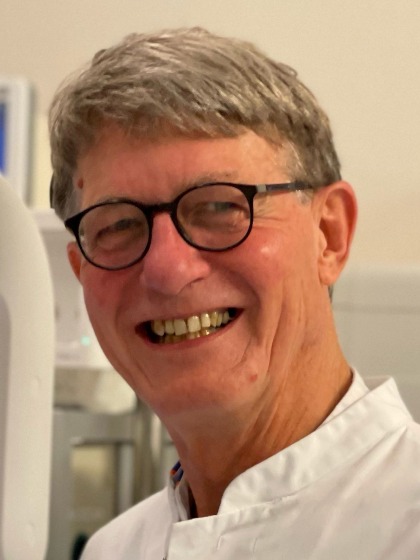
prof. dr. A.F. (Arend) Bos

Research interests
Arend Bos is Professor in Pediatrics
and Neonatology and head of the division Neonatology of the Beatrix
Children’s Hospital, located at the University Medical Center
Groningen, The Netherlands. His expertise and research focuses on
neonatal brain function and development of children, particularly
of those children who experience a difficult start at birth and
need to be admitted to the neonatal intensive care unit (NICU). The
aim of the neonatal team of docters and nurses in Groningen is to
improve the long-term outcome of the NICU children, by
investigating potential risk factors in relation to various
non-invasive methods to monitor neonatal brain function. He is
member of the General Movements Trust, an international group of
researchers, together with whom he developed a method to assess
brain function in young infants from their spontaneous movements.
Since 2011 he is ambassador of the foundation Make a
Memory.
Brief summary of the research
over the last 5 years
Improved neonatal care over the
last decades has led to significant lower mortality in seriously
ill newborn infants. However, the prevalence of both major and
minor neurological deficits and developmental disorders has not
decreased. Many maternal, fetal and neonatal risk factors pose a
threat on the developing brain, and in many instances it is unknown
if they really do and to what extent.
Therefore, the general aim of the
clinical research-line Neonatal Neurology of the division of
Neonatology of the Beatrix Children’s Hospital (University
Medical Center Groningen) is to improve the developmental outcomes
of newborn infants. This is done by investigating the influence of
several known and unknown risk factors on the integrity and
development of the young nervous system, by combining clinical and
translational science.
There are three branches of the
research program of Neonatal Neurology. The first branch relates to
the perinatal risk factors. These include among others maternal
risk factors, prematurity, oxygen deficit, congenital cardiac
disease, persistent ductus arteriosus, gastrointestinal and
surgical risk factors, environmental pollutants, etc. The second
branch relates to the non-invasive diagnostic tools that are
available in the neonatal period up to several months of life, in
order to assess brain function accurately. These tools include the
assessment of general movements (GMs), the assessment and analysis
of sucking patterns, the analysis of the amplitude integrated EEG
(aEEG), and the assessment of brain and systemic tissue oxygenation
using Near Infrared Spectroscopy (NIRS). The third branch relates
to a thorough follow-up examination, up to adolesence, with respect
to motor, cognitive and behavioural functioning of children both at
low and at high risk of neurodevelopmental problems.
Together, the research in these three
branches leads to understanding of mechanisms of brain injury in
young infants, and to interventions that may lead to better
outcomes later on, for both the individual child and his or her
family. An example of a unique project in this respect is providing
Life-performed Music Therapy for the most vulnerable and tiny
infants admitted to the NICU, and investigating its effects on
stress, family-coping and neurodevelopmental outcomes.
